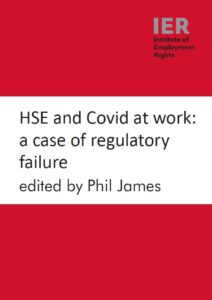Has the pandemic revealed a deliberately failing State when it comes to health and safety at work?
Professor Miguel Martinez-Lucio considers the lessons learned from IER's latest report - HSE and Covid at work: a case of regulatory failure

The current pandemic has revealed many problems in relation to the State and the question of health and safety in the UK. As with any crisis, it does not solely throw down a ‘new’ challenge that requires new public policies and new forms of State intervention, but also brings to light the underlying strengths and weaknesses of the system of regulation and state action. In the case of the UK, the experience of the pandemic has been one of the worst in the world in terms of mortality rates. It has exposed weaknesses across a range of economic activities and policies; among others, public procurement strategies, industrial infrastructure, health provision, and care for the elderly. In effect, the pandemic has revealed decades of underinvestment, and a lack of effective regulation and planning in core areas. We are now fully aware of this in the UK although, for various cultural and political reasons, the extent of this mismanagement, at best, or corruption, at worst, seems to resonate less than it should do. Be that as it may, the pandemic and its legacy will no doubt be the subject of future investigations and formal public inquiries.
Within this catalogue of mismanagement and consistent mishandling of events, there looms the issue of health and safety at work. During the pandemic, a body of evidence has been building regarding the risks workers have been taking at their workplaces: call centres, hospitals, care centres for the elderly, public transportation, delivery, and so on. Academics and researchers working on employment across a range of disciplines have been quick to respond, and to highlight some of the dangers of working during a pandemic and, in many cases, being exposed to unnecessary risks. The chorus of disapproval and concern has highlighted the challenge brought on not only by the pandemic, but also by what is, in effect, a failed state – and, perhaps, a deliberately failing State.
The chorus of disapproval and concern has highlighted the challenge brought on not only by the pandemic, but also by what is, in effect, a failed State – and, perhaps, a deliberately failing State.
The decision by government to limit labour inspections, limit the resourcing of enforcement agencies, and put the onus on increasingly voluntary commitments to ‘wellbeing’ means that the State is not fit-for-purpose in regulating the health and safety consequences of the pandemic. Paralleling what has been a deliberate curtailing of health and safety regulation and enforcement (catalogued in this report by many of the contributors for some time), for decades there has also been a stigmatising of health and safety rights in the press and among large parts of the political establishment – especially on the right. This stigmatising is less common in other European contexts and marks a peculiar cultural characteristic of British discourse on work as Steve Tombs has regularly pointed out. Alongside these institutional and ideological factors, we have seen growing interest in nebulous concepts such as ‘wellbeing’ that are often used to transfer to the individual the responsibility for health and safety: to some extent, wellbeing has been a concept that has been key to the ongoing trivialising of health and safety rights. These changes have been possible due to an ongoing and systematic undermining of collective worker representation in the UK since the 1980s (with some brief temporary pauses).
The report HSE and Covid at work: a case of regulatory failure, edited by Phil James and bringing together some of the most significant voices on health and safety research in the UK, is an attempt to highlight how what we are living through is the inevitable outcome of attempts over decades to weaken the Health and Safety Executive (HSE). The report not only brings to the fore the failings of the HSE in terms of public intervention, but also points to an important fissure within the State in relation to the pandemic. The report highlights how the body of laws that are key to the regulation of health and safety at work seem to be deliberately detached from the formal advice and intervention of the State through such bodies as the HSE. That is to say that, even within the State, there is now a disjuncture between the legal sphere and the sphere of state intervention: this is visible across a range of other areas of government policy regarding procurement of materials and the ethical conduct of ministers (or senior advisors) in relation to the pandemic’s required responses. In effect, we have seen the question of health and safety being redefined through forms of action and advice by the State that are not framed by the body of law on the matter. What is more, the body of rights related to worker representation in the area have been also restricted or under-referenced in the responses to how health and safety should be implemented. In effect, what we have now is a voluntary approach based on employer discretion. Essentially, what was a beacon of good practice and an exemplary feature of the State – the HSE – has been politically compromised within the current context (something we have seen with other work and employment State-related agencies).
The report not only brings to the fore the failings of the HSE in terms of public intervention, but also points to an important fissure within the State in relation to the pandemic.
The report calls for a reboot of health and safety intervention, increasing awareness of the rights the state has granted us (based, historically, on our own struggles), and the need to strengthen worker voice among other rights and actions. It also calls for the political independence of the HSE. As someone with a history of teaching and research on industrial relations – and who has a comparative interest in not only studying it, but also in relation to the emergence of employment regulation and representation from authoritarian systems amongst others – it is alarming to hear that the UK State is, in effect, disinheriting and ignoring its own and fundamental obligations to its citizens in terms of their health and safety. It also reminds me of studies of liberal democracies and modern, independent systems of industrial relations when the contributors call for State agencies to be independent and fair (something that was common in studies on Spain, Greece and Portugal in the 1970s and 1980s and even Chile more recently). This fundamental schism between the law and its implementation inside the realm of the State in the UK, and this failure to guarantee independence in key State agencies, marks a further and perturbing turning point in the disabling of people’s rights.





